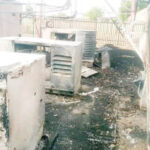The commonest boats used in the state for riverine transportation include the ferry (cargo) boat, engine (plank) boat and flying (speed) boat. Traders and market women mostly prefer the cargo boat because of its huge capacity to accommodate their wares, farm produce and other items which are ferried at cheaper rates.
Passengers who prefer the use of this boat are never in a hurry to reach their destination. The boat is very slow in motion and can spend eight or 24-hours between Brass and Yenagoa covered by the speed boat in two hours.
Kessiana Whyte, a fish trader explained that the cargo boat affords her the opportunity to do her business with ease and at cheaper rates across the river.
According to her, “the cargo boat is like a train. It helps me to travel with all the items I carry for business every Swali market day especially on Mondays and Thursdays but I hate the delay. We spend a day or many hours just to get to Yenagoa from Brass.”
The “Speed” or “Flying” boat which is however more popular and a traveller’s delight, attracts higher prices for its passengers. It has the capacity to carry between eight and twelve persons on a trip and charges exorbitant fares.
Chief Fini Coker who runs a boat business from Ogbokokiri in Akassa said passengers pay as much as N1,700 from Ogbia to Brass and N2,000 between Brass to Yenagoa, while N1,000 is charged from Brass to Nembe. He attributed the high cost of riverine transportation to the huge investment to acquire speedboat and its maintenance.
According to Coker, a single engine costs N1.5 million while the double engine goes for as much as N3.5 million. On the challenges of doing boat business, he said the attempts by drivers to outwit each other because of passengers remains the biggest problem facing the trade.
Corroborating him, another driver, Mr Ebi Tarinyo, said that drivers are too greedy, noting that the job is quite interesting and that accidents do rarely occur.
Interestingly, the speed boat from Twon Brass jetty does have their regular time movement. The take-off time for speed boats from Twon-Brass jetty on a daily basis are between 7:00am, 12 noon and 3:00pm.
Ikioyoa Bayoka, another operator said the timing is at the instance of the company that runs the business from Brass to other parts of the riverine community for convenience but it does not apply to him as a private boat driver.
For him, the business is very lucrative because he takes home a profit of N10,000 daily if he gets enough passengers to board his boat for the day at the rate of N1,800 between Yenagoa and Akassa on a return trip for a maximum number of 12 persons.
While for the same number of passengers, he charges a minimum of N1000 each between Nembe and Brass for a 45 minutes cruise and buys petrol at N2,000. The charges however, depend on the availability of fuel. It could be higher when there is scarcity of petrol.
Bayoka maintained that the high charges is due to the cost of fueling their boats which is still better than the services rendered by the Plank boat that consume as much as between 30 and 75 gallons of fuel to reach its destination.
One of the passengers, Mr Eugene Spiff, said cruising on speed boat to his home town, Brass from the state capital, Yenagoa is usually a delightful experience for him, especially given the fact that he has to cross three major seas to get to his destination makes him appreciate the wonders of nature.
“I am always excited each time I travel by speed boat to my home town. I am from Twon-Brass and the only means to get to my place is through water transport. I like it. I enjoy it. I don’t regret it and will always love it.
“The water could be menacing at times, but I am used to it. I was born into the system and will continue to cross three big seas to reach my destination; Twon-Brass from Yenagoa. It is such an interesting experience,” Spiff stressed.
Another passenger, Domo Adams, who boarded a speed boat from Yenagoa waterside jetty, observed the numerous challenges of traveling on speedboat to include the dangers of boat mishap, sea pirates and provision of adequate lifeguards by the boat drivers for their passengers.
He blamed the marine authorities for not living up to expectation in ensuring that the use of obsolete boat engines and incompetent drivers are sanctioned and thrown out of the system.
Adam who said he pays the sum of N2,500 as transport fare to Akassa, his hometown, narrated the bitter experience he sometimes encounters in the hands of untrained and incompetent drivers.
His words, “we get to the middle of nowhere, bad spots at times and the engine starts misbehaving because it is obsolete. That for me, is life threatening. It saddens me that most of the boats you see here have obsolete engines and their drivers need to be trained”.
Adam further appealed to government to provide marine transportation in order to reduce the cost of transport and as well ensure adequate Naval patrol teams for surveillance on waterways.



